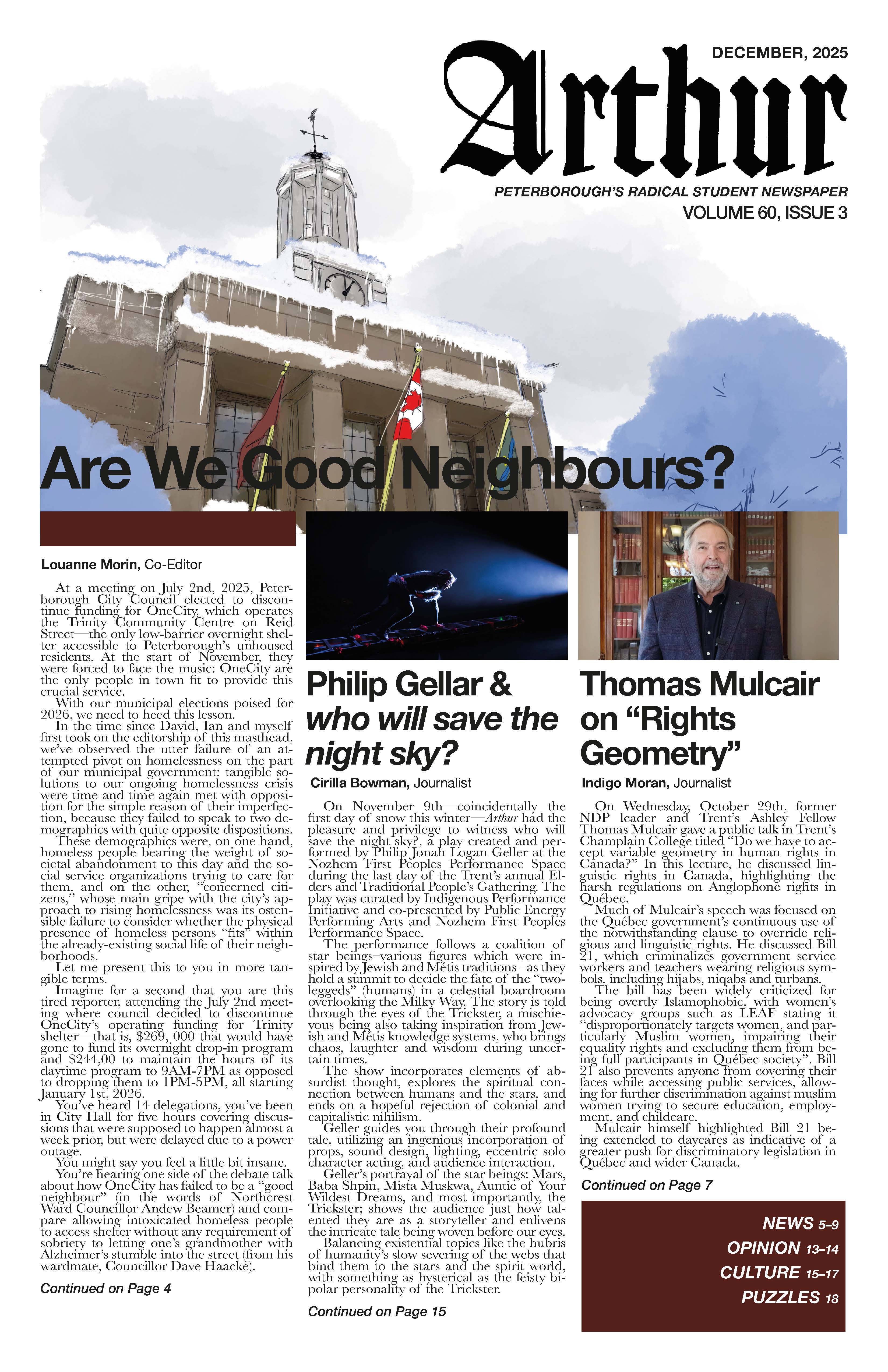A few key motions were passed at last week’s June 25th meeting of the Trent Board of Governors. It was the final meeting of the board before a new term begins in July, and the last meeting for multiple governors including Chair Armand La Barge. Year end reports were presented on topics ranging from enrollment, finances, the Annual Report on Sexual Violence, and the Annual Report on Indigenous Community Relations.
Trent’s Indigenous Community Relations
Trent’s role in reconciliation was discussed by President Leo Groarke, VP Julie Davis, and Curve Lake First Nation Chief, Emily Whetung who was invited by the University to speak on the topic.
President Groarke’s remarks noted Trent’s commitment to working towards reconciliation. In light of the recent discoveries of mass graves of Indigenous children at residential schools across the country, Groarke offered his condolences, “Our flags are at half mast, and I did want to note that there have been numerous statements and a number of remembrance events that we have held so far.”
Groarke elaborated on Trent’s historical relationship with Indigenous peoples, “Just in case there's any new members of the board or any one else that’s not aware of it, I would remind people we did establish the first Indigenous studies (at that point aboriginal studies) program in Canada, we did establish the first PhD program in Indigenous studies in Canada, and we are one of only a handful of universities in Canada which require all students who attend university to take a course in Indigenous studies. And I’ll just say that I hope we will continue and re-double our efforts in that regard.”
Chief Emily Whetung took the floor to comment on Curve Lake First Nation’s relationship to Trent. She addressed the Board saying, “I hope you are as happy with where things are at the end of my comments as we are at our council table.” She shared her gratitude to Trent for their ongoing commitment to working closely and respectfully with Curve Lake over the years.
“Over the last century [Curve Lake has] become a model community, opting for a democratic governance system before it was forced on so many of us by the Indian Act.”
Chief Whetung compared the difficulties of the COVID-19 pandemic to those suffered by Indigenous nations in the early years of colonization, “I recently considered that whether we wanted to or not we have had to open up our homes and personal spaces to the world in every video call, video chat and virtual meeting, we have revealed our way of life to each other. From pets barking, to children waving in the background everyone has had a glimpse into our lives. We have all invited that positivity, or negativity, and certainly invasiveness, into our personal spaces and for that I think we can all acknowledge that we now have a shared experience.”
“If you take a moment and magnify this shared experience in its most negative aspect, you may be able to see what it might have been like for my ancestors to have to open up our land, to have to alter our way of like, to have to hide, to be pressured into signing treaties, whether we wanted to of not.”
“I hope that we can all reflect upon our current, new experience through this pandemic and look with more understanding on the historic experience of my ancestors as a shared experience to learn more about each other and come together in a meaningful way.”
Chief Whetung characterized Curve Lake’s relationship to Trent University as excellent. On her own qualitative spectrum which she has implemented as a model to navigate Curve Lake’s relationship with various groups, projects and actors, Trent represents the model relationship: “[an] easy ongoing relationship with regular communication, a shared vision, and common attainment of goals. We build projects together, from inception to completion.” She noted the relationship is one that is respectful of the Michi Saagiig belief in balance, and protection of all human and non-human relations.
Chief Whetung commended Trent for being, “an institution committed to ensuring that the truth is preserved.” “I can’t imagine a student at Trent University who was unaware of the basics of the history of Canada and the treatment of Indigenous people,” she said.
Chief Whetung reflected on the news of the residential school discoveries, “the issue of residential schools does not stand alone from the issue of development in our territory, and if you do not understand the impacts of residential schools on our societies and our civilization, you can never fully understand our perspective.”
In paying her respect to the hundreds of Indigenous children discovered at residential schools Chief Whetung shared with the Board that her office window overlooks a daycare playground. “Everytime I pause in my work, I watch them, and this brings me such immense joy,” she said, “they are the reason I sit at this desk, they are the reason I work late into the evening, they are our future.”
Enrolment, Covid Finances, Tuition increases
In the end-of-year financial report, the Board of Governors acknowledged that COVID-related costs did not hit the University as hard as expected. Domestic enrolment was not disastrous, and “in year enrollment gains were 4.6% over budget.”
Additionally, COVID-related losses and expenses were roughly $1 million less than expected. This, combined with multiple grants including $5.9 million from the province resulted in a surplus of $5.8 million. This left $14.9 million to be spent on “strategic investments,” which include “teaching and labspace investments, investments in the centre for teaching and learning in online learning, research investments, IT infrastructure renewal, infrastructure investments and enhancements for Trent Lands, matching funding contribution for new Trent enterprise centre, deferred maintenance and upgrades to ancillary properties, retention investments including international and ongoing COVID-related investments.”
In addition to these ‘strategic investments,’ the Board approved a motion to increase out-of-province tuition by 3%.
Since the province’s decision in late April to allow out-of-province tuition increases, university boards across Ontario face the very same decision as Trent. Incoming Board Chair, Debra Cooper Burger characterized this as an “opportunity” from the province, and one that is quite “political.”
President Groarke explained that the Council of Ontario Universities (COU) has been lobbying the province for the ability to increase tuition. Both Groarke and Cooper Burger situated this decision within a difficult time for universities, referring to ongoing cuts and the drying up of federal and provincial funding that has plagued these institutions for years. President Groarke speculated that provincially differentiated tuition could be the future tuition model in Canada.
In late May, University of Ottawa’s Student Union mobilized to stop their own Board of Governors from approving this increase. They argued that it would disproportionately affect Québécois students, as U of Ottawa is close to the provincial border. The UOSU campaigned, sending over 1 800 emails according to the president.
Wendy Walker, President of Trent Central Student Union, confirmed with Arthur that the union was not aware of the Board’s plans to increase tuition prior to the Board of Governors meeting.
Ultimately, Cooper Burger stated this wasn’t a financially impactful decision for Trent, which only has about 100 to 120 out-of-province students. “We’ve been constantly advocating for a change to tuition...and [if] we don’t accept...I think we have to acknowledge that this has been an opportunity that the provincial government has given us to address the tuition issue.”
“If we choose not to, I think it sends the wrong message,” said Cooper Burger.
The Board voted unanimously to raise tuition. This increase will apply to all new applicants coming to Trent from out of Ontario in the 2021-2022 academic year.
This decision comes a few months after the March 26th Board of Governors meeting where a motion passed to increase international student tuition by 8% for incoming and 5% for returning students.
President Groarke did acknowledge what he called the “fly in the ointment.” Student applications for the Durham campus’ newly built residence are not meeting expectations. Trent’s agreement with Campus Living Centres, contracted to develop, build and maintain the Durham residence, requires Trent to fill 95% of the residence in the 2021-2022 academic year. While Trent has committed to fill 190 out of the 200 rooms, only 72 applications have been completed, with a total of 116 in progress.
Groarke’s “realistic hope” is to secure 100 students. This is only the second year the residence has been open, last year there were decidedly fewer students for COVID-related reasons.
President Groarke discussed the possibility of using the residence as hotel space but no plans were made. “You have to be careful about mixing students and non-students,” he said, as there are “a lot of complexities.” If this doesn’t work, the cost of the remaining rooms will have to be paid out to Campus Living Centres. Groarke added that further decisions would follow later in the summer, closer to move-in day.
While there is much we don’t know about the upcoming academic year, it seems that Trent has weathered the COVID storm for the most part. International enrollment at the Durham Campus is up 119% over last year and international acceptances overall are up 21% from last year. Groarke noted that these international student numbers are still lower than the target, and that this “is somewhat unfortunate as our hope was to move in that direction.”





.png)



.jpg)









.jpg)











.png)